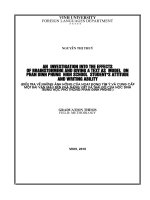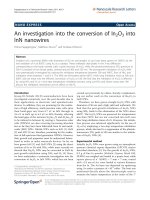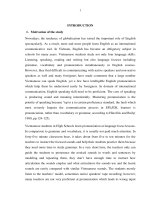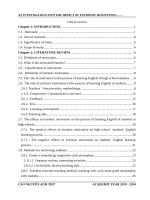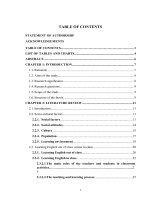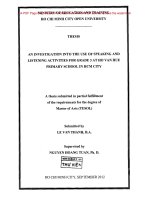An investigation into the influence of parental expectations and support on their children’s learning – english motivation
Bạn đang xem bản rút gọn của tài liệu. Xem và tải ngay bản đầy đủ của tài liệu tại đây (709.77 KB, 68 trang )
VIETNAM NATIONAL UNIVERSITY- HANOI
UNIVERSITY OF LANGUAGES AND INTERNATIONAL STUDIES
FACULTY OF POST-GRADUATE STUDIES
*****************
NGUYỄN THỊ TUYẾT LAN
AN INVESTIGATION INTO THE INFLUENCE OF
PARENTAL EXPECTATIONS AND SUPPORT ON THEIR
CHILDREN’S LEARNING – ENGLISH MOTIVATION
(Một nghiên cứu điều tra về tác động của sự mong đợi và hỗ trợ
của cha mẹ đến động lực học Tiếng Anh của trẻ)
M.A. MINOR PROGRAMME THESIS
Field: English Teaching Methodology
Code: 60140111
HANOI – 2017
VIETNAM NATIONAL UNIVERSITY- HANOI
UNIVERSITY OF LANGUAGES AND INTERNATIONAL STUDIES
FACULTY OF POST-GRADUATE STUDIES
*****************
NGUYỄN THỊ TUYẾT LAN
AN INVESTIGATION INTO THE INFLUENCE OF
PARENTAL EXPECTATIONS AND SUPPORT ON THEIR
CHILDREN’S LEARNING – ENGLISH MOTIVATION
(Một nghiên cứu điều tra về tác động của sự mong đợi và hỗ trợ
của cha mẹ đến động lực học Tiếng Anh của trẻ)
M.A. MINOR PROGRAMME THESIS
Field: English Teaching Methodology
Code: 60140111
Supervisor: Prof. Dr. Hoàng Văn Vân
HANOI - 2017
DECLARATION
I hereby declare that my thesis “AN INVESTIGATION INTO THE INFLUENCE OF
PARENTAL EXPECTATIONS AND SUPPORT ON THEIR CHILDREN‟S LEARNING –
ENGLISH MOTIVATION” submitted for the Faculty of Post-Graduate Studies,
University of Languages and International Studies, Vietnam National University
has been composed by myself, apart from the help recognized. This paper has also
not been submitted for any other degree or processional qualification except as
specified.
Hanoi, 2017
Nguyễn Thị Tuyết Lan
i
ACKNOWLEDGEMENTS
I would like to send my thanks to many individuals for their invaluable help
during the conduct of the research. Without their help, the completion of this
research project would not have been possible.
First and foremost, I would like to express my special appreciation and
thanks to my supervisor, Prof. Dr. Hoang Van Van for his remarkable supervision,
enthusiastic guidance, invaluable support and critical feedback throughout the
research.
Besides my advisor, I wouldlike to thank all the Board and teachers from
Doan Thi Diem – Ecopark private secondary school for their assistance in providing
information and distributing questionnaires and interviews to parents and students at
grade 8.
Next, I wish to send my big thanks to the students at grade 8A and 8B and
their parents for their cooperation and the valuable information they provided in my
research questionnaire and interviews.
Furthermore, I would like to give my heartfelt thanks to my family and
friends, especially my mother, for standing by me and for giving me their
unconditional love, care, good assistance and patience.
Finally, my sincere thanks also go to graders and readers for their valuable
evaluation and feedback on this thesis.
ii
ABSTRACT
This study examines the impact of expectations and support given by the
parents on learning English motivation of grade 8 private school students. The
purpose of this study was (a) to explore parental expectation and support to
children‟s English learning, (b) to demonstrate the correlation between parental
expectation and support and their children‟s English learning motivation. Survey
questionnaire was used as a tool for data collection. Further interviews to both
parents and children were also conducted to find out the reasons for the results
obtained from the questionnaire. The data regarding parental expectation and
support, their influence on learning motivation was collected from a sample of 90
parents and their 90 students in 8th grade from Doan Thi Diem- Ecopark school in
Hung Yen, Vietnam. After the analysis of data, it was concluded that most of
parents are well aware of their role for their children‟s English learning. However, a
noticeable thing is that parents do not directly join in their children‟s learning
activities although their attitude is of responsible type. Above all, the findings of the
study revealed that parents‟ contribution to their children‟s education has a both
positive and negative effect on learning motivation.
iii
CONTENTS
Declaration ................................................................................................................ 10
Acknowledgements .....................................................................................................ii
Abstract ..................................................................................................................... iii
Contents ...................................................................................................................... iv
Table of contents ........................................................................................................ vi
CHAPTER 1: INTRODUCTION ............................................................................ 1
1. Rationale .............................................................................................................. 1
2. Aims & Research Questions ................................................................................ 3
2.1 Aims of the study ........................................................................................... 3
2.2 Research questions ......................................................................................... 3
3. Scope and significance ........................................................................................ 4
3.1 Scope of the study .......................................................................................... 4
3.2 Significance of the Study ............................................................................... 4
4.Organization of the study...................................................................................... 4
CHAPTER 2: LITERATURE REVIEW ................................................................ 5
1. Defining parental expectations ............................................................................ 5
2. Defining parental support .................................................................................... 7
3. Defining children‟s learning-English motivation .............................................. 10
3.1 Definitions of motivation ............................................................................. 10
3.2 Types of motivation...................................................................................... 10
3.3 The Importance of motivation in second language learning ........................ 12
3.4 Relevant research ......................................................................................... 12
4. Parental expectations and support and children‟s learning motivation ............. 13
CHAPTER 3: METHODOLOGY ......................................................................... 15
1. Method of the study ........................................................................................... 15
2. Context of the study ........................................................................................... 16
3. Participants......................................................................................................... 16
4. Data collection instrument ................................................................................. 17
iv
5. Data collection and analysis procedures ............................................................ 20
CHAPTER 4: FINDINGS AND DISCUSSION ................................................... 22
1. Parental expectations ......................................................................................... 22
1.1 Short-term expectations ................................................................................ 22
1.2 Long-term expectations ................................................................................ 24
2. Parental support ................................................................................................. 24
2.1 Learning processing investment ................................................................... 25
2.1.1 Material support from parents ................................................................ 25
2.1.2 Time support from parents ..................................................................... 31
2.2 Learning processing management ................................................................ 33
2.2.1 The parental frequency of keeping in touch with school, English center
and tutor .......................................................................................................... 33
2.2.2 Rewards and punishments...................................................................... 36
3. The correlation between parental expectations and support and their children‟s
learning-English motivation .................................................................................. 39
CHAPTER 5: CONCLUSION AND RECOMMENDATIONS ......................... 44
1. Conclusion ......................................................................................................... 44
2. Recommendations .............................................................................................. 45
REFERENCES ........................................................................................................ 47
APPENDIX 1 .............................................................................................................. I
APPENDIX 2 ............................................................................................................ III
APPENDIX 3 ............................................................................................................. V
APPENDIX 4 .......................................................................................................... VII
APPENDIX 5 ............................................................................................................IX
APPENDIX 6 ............................................................................................................. X
v
TABLE OF CONTENTS
Table 1: Short-term expectations from parents ........................................................ 22
Table 2: Long-term expectations from parents ......................................................... 24
Chart 1: parental support by investing in extra learning ........................................... 26
Table 4: parental support by investing in learning equipment......................................... 28
Table 5: Time support from parents .......................................................................... 31
Table 6: The parental frequency of keeping in touch with school, English center and
tutor ........................................................................................................................... 34
Table 7: Rewards and punishments from parents ..................................................... 37
Table 8: The correlation between parental expectations and support and their
children‟s learning-English motivation ..................................................................... 40
vi
CHAPTER 1: INTRODUCTION
1. Rationale
Education is essential for the development of society. The more educated the
people of a society are, the more civilized and well disciplined the society might be.
Mainly, family has responsibility to socialize children for making them productive
members of society. The more the parents involve in the process of imparting
education to their children, the more the children might excel in their academic
career and to become the productive and responsible members of society.
It has been assumed that academic achievement of students may not only
depend on the quality of schools and the teachers, rather the extent of parental
involvement has vital role to play in academic achievement of their kids. The focus
of this study is to examine a relationship (if any) between the extent of parental
involvement in academic activities of their children and the level of their children‟s
academic achievement. The transition from middle school to secondary school may
be
an
overwhelming
and
stressful
experience
for
young
adolescents.
Developmentally, students are entering a period in their lives when their physical,
cognitive, psychological, and social characteristics are beginning to evolve.
Secondary school students experience both a contextual change and a personal
change during this transition. It may often be a confusing time for students, their
families, and the other adults in their lives who seek to support their healthy
development and learning. The secondary school learning environment may be
more complex than elementary school and academic achievement expectations
increase. Children are more likely to have higher academic achievement levels and
improved behavior when families are involved in their education (Bryan, 2005).
Learning begins at home through interaction with one‟s family.
Parental involvement in a child‟s education along with environmental and
economic factors may affect child development in areas such as cognition,
language, and social skills. Numerous studies in this area have demonstrated the
importance of family interaction and involvement in the years prior to entering
1
school (Bergsten, 1998; Hill, 2001). Research findings have also shown that a
continued effort of parental involvement throughout the child‟s education can
improve academic achievement (Driessen, Fan, 2001; Hong & Ho, 2005).
Academic failure has been linked with risk behaviors and negative outcomes such
as; substance abuse, delinquency, and emotional and behavioral problems
(Annunziata, Houge, Faw, & Liddle, 2006).
There is little research available on the relationship between parental
involvement and academic achievement of secondary school students. The majority
of the research in this area has been conducted solely with elementary school
students (Baily, Silvern, Brabham, & Ross, 2004). This study may provides an
indepth look at one aspect of parental involvement, involvement in academic
activities of their children, and academic achievement of secondary school students.
The non-stop development of the present society requires each family unit to
involve in their children learning more than ever. Nonetheless, it is the busy life and
financial burden that make parents always worried about how to ensure their
families‟ living standards. As a result, they do have less time to keep continual
contact with school and teachers to follow or manage their children‟s learning. This
time limitation is also the reason why mothers and fathers cannot directly instruct or
remind their kids during their learning process. It is something of a paradox that
parents often put high expectations into their children‟s education while they do not
spend much time on guiding their children to learn. One of the popular alternatives
which parents apply to compensate for this trend is financial support and investment
and then completely entrust schools, learning centers or even for tutors to care their
kids‟ learning without knowing whether or not their support is effective enough.
Parental involvement in children‟s learning has been linked with academic
achievement. Despite the fact that family is not the only factor affecting to students‟
learning environment, it plays one of the most decisive roles in children‟s learning
process. Although there is a lot of research to investigate the relationship between
parental involvement and their children‟s learning motivation, as reviewed above,
2
little research has been done in the area of parental involvement and secondary
school students in Vietnam. This research project sought to identify the different
levels of parental expectations and support to their children‟s learning and how
parental involvement affects learning motivation of secondary school students.
2. Aims & Research Questions
2.1 Aims of the study
This study was conducted to investigate the following issues: (1) the types of
expectations parents have regarding their children‟s English learning, (2) the ways
parents support their children to motivate them for their better academic
achievements, (3) the impact of parental involvement (expectations and support) on
their children learning motivation.
2.2 Research questions
Studying motivations and expectations in language learning from socialpsychological perspectives is a well-established research theme in western ELT (e.g
Gardner, 1985; Brophy, 1999; Dornyei, 2003, 2005). Researchers look for intrinsic
and extrinsic motivations of learners of English as a second language, to understand
their needs and reasons for studying the target language. Expectations come from
teachers, children themselves, peers, relatives, friends and their parents. High
expectation may lead to higher achievement (Rubie-Davies et al. 2010).
There are very few published research papers in Vietnam on the motivation
and expectations of secondary school English learners and their parents. This leads
to the three major research questions of this research project:
1. What types of expectations do parents have regarding their children’s English
learning?
2. How do parents support their children to motivate them for their better English
learning?
3. What is the correlation between parental expectations and support and their
children’s learning-English motivation?
3
3. Scope and significance
3.1 Scope of the study
Due to the time limitation, this study just focuses on a limited sample of 90
parents and their 90 children who are studying at a private secondary school in
Hanoi.
3.2 Significance of the Study
The study hopes to: (1) bring awareness in the community about the role of
parental involvement to their children‟s motivation towards English learning, (2)
increase the interest of the students through parents‟ involvement in their English
learning, (3)strengthen the relationship between school and parents for better
academic performance of the students.
4. Organization of the study
The study consists of 5 chapters as follows:
Chapter 1: Introduction of the research
Chapter 2: Literature review (Other research on this topic is discussed)
Chapter 3: Methodology (the way the researcher collected the data as well as
analysis them is showed)
Chapter 4: Findings and discussion
Chapter 5: Conclusion and recommendations
4
CHAPTER 2: LITERATURE REVIEW
Parents play an extremely important part in children‟s upbringing because it
has a sharp impact on their children‟s outcomes in schools. They express passions
and strong desires to help their children obtain success regardless of race, ethnicity,
or social status. That is the reason why they always take their children‟s education
into very careful consideration. In other words, it can be said that parents are
considered as an indispensable factor in the process of promoting and supporting a
child‟s comprehensive development including physical, emotional, intellectual and
social aspects from childhood to adulthood, in which intellectual development is
one of the most outstanding. Once again, this strongly supports for favorable
parental concepts to the importance of education. It is these views that create a set
of educational belief, attitude and expectations and support among parents to their
children. Boocock (1972) shared the point that parental expectations have major
influences on children‟s academic performance. Specifically, parents‟ expectations
can be understood as a variety of parental behaviors that directly or indirectly
influence children‟s learning motivation. Following this, simultaneous parental
assistance is also formed to strengthen children‟s positive attitude to learning, which
helps them aware the importance of education and promote to learn better as well.
Mainly basing on the theoretical approach, the researcher will bring together
various concepts from several scholars, which address the relationship between
parental expectation and children‟s academic performance. As a result of
summarizing these viewpoints, influences of parental expectations and support on
children‟s learning motivation, especially in learning a second language like English
are also expected to be discussed in details.
1. Defining parental expectations
According to Oxford Advanced Learners dictionary, expectation refers to “a
strong belief about the way something should happen or how somebody should
behave”. Meanwhile, from the perspective of psychology, expectation is a
changeable mental status, which can be considered as a predictable recognition
5
based on people‟s reactions to external contexts or the need for inner strength
arising from their own or others‟ prediction of behavioral outcomes (Zhu, 1989).
The term parental expectation has already appeared in much literature.
Parental expectations mainly consist of the attitudes a parent has about their
children‟s academic success and educational outcomes (Cook, 2009). As mentioned
above, Boocock (1972) notes that parental expectations affect children‟s academic
performances. In order to further clarify the definition, Seginer (1983) points that it
typically referred to parents‟ desires or wishes regarding their children‟s future
attainments in schooling.
Other researchers distinguish between realistic and idealistic expectations
regarding the possibility of their realization (e.g. Stern, 2007). A realistic
expectation typically refers to parental prediction of children‟s academic
performance based on school feedback, such as information that parents gain from
their children‟s school report. Meanwhile, idealistic expectations are the wishes,
dreams, desires, and hopeful anticipations or parental beliefs about their children‟s
academic future (Seginer, 1983).
Even though “parental expectation” may be defined variously by different
researchers, this study characterizes parental expectations which have been seen in
terms of short-term (Entwisle and Hayduk, 1978) and long-term expectations (Clare
et al., 1998). Therefore, a short-term expectation refers to parents‟ academic or
social developmental goals for their children in the immediate or near future, while
a long-term expectation accounts for the future or long-lasting anticipation of
children‟s educational attainment (Cook, 2009).
This study will be analyzing parental expectations basing on the theory of
short-term and long-term by Cook (2009) because of the following reasons:
Firstly, it is suitable for the Vietnamese society. The social development of a
developing country like Vietnam requires individuals to possess not only a broad
knowledge, high educational background, but good skills of foreign languages. To
adapt to this, it is compulsory for people to improve themselves better if they want
6
to have a good stable job, and the ability to survive in a competitive world. Of
course, every parent is definitely aware of this trend. They all expect their children
to have a bright education attainment in the further future.
Secondly, it is suitable for Vietnamese parents‟ psychological development.
We must admit that English has been the most popular language widely used all
over the world. Being aware of this, fathers and mothers have tendency to provide
children with a chance of learning English as soon as possible. It is clear that there
is no reason for parents to do that, but their expectation to children. Traditionally,
Vietnamese parents regard children as their property and pride as well. That‟s why
they always have a desire that their children will be good in the immediate or near
future.
2. Defining parental support
When parents put their expectations and beliefs on their children, it is
definitely easy to understand for them to give the best support to their children so
that they can reach the learning goal and target.
Parental support is a multidimensional construct (Fan, 2001). Research
studies have presented some theoretical frameworks for parental support (GonzalezPienda et al., 2002; Fan, 2001). Researchers have supported that some dimensions
of parental support may have more visible effects on students‟ academic
achievement than others. Gonzalez-Pienda et al. (2002) stated that parental support
criteria were developed according to six dimensions that are strongly associated to
students‟ behavior at school and the attitude towards learning.
“The six dimensions are (a) parents‟ expectations about their children‟s
achievement, (b) parents‟ expectations about their children‟s capacity to achieve
important goals, (c) parents‟ behaviors that reveal interest in their children‟s school
work, (d) parents‟ degree of satisfaction or dissatisfaction with their children‟s level
of school achievement, (e) parents‟ level and type of help provided when their
children do homework, and (f) parents‟ reinforcement behaviors of their children‟s
achievements. Research studies have pointed out that some dimensions of parental
7
involvement may have more noticeable effects on students‟ academic achievement
than others” (p.259).
Generally, parents are not directly involved in the teaching-learning activities
in school. Then, they are only expected to provide the financial and other material
support for the children‟s schooling. In spite of not directly guide children at school,
parents are considered as “a teacher” who provides a lot of help when their children
do the homework. Homework can be defined as “task that are assigned to students
by teachers and are meant to be performed during nonschool hours” (Eilam, 2001,
p. 692). A student is supposed to complete his/her homework at home, parents or
other family members may be involved in the process of helping or guiding the
child. They either help the child in doing the home task assigned by the teacher or
facilitate him/her in relation to difficulties in syllabus. Research studies indicated
that parental support in doing home tasks has significant effects in students‟
motivation (Singh, 2002). Agreeing with this view, Ronald Ferguson, in his
“research-based tips for high-achievement parenting”, suggest that parents promote
reading at home, discuss reading materials with their children in ways that
encourage children to enjoy learning, and seek opportunities at home to discuss and
apply what children are learning in school, among other activities. Ferguson further
recommends that parents set clear and firm rules about homework, television
watching, and other daily activities, and that they actively seek out-of-school
opportunities and extracurricular activities that reinforce school lessons, encourage
exploration and creativity, and develop children‟s special talents (Ferguson, 2007a).
In other words, parents who are actively involved in their children‟s
education and provide a stimulating learning environment at home can help their
children develop feelings of competence, control, curiosity, and positive attitudes
about academics.
As mentioned above, if a student has a belief that a goal is unattainable, then
there is really no need to attempt to achieve that goal. Extrinsic motivation causes
students to perceive more goal as unattainable, whereas intrinsically motivated
8
student will see very few goals as unattainable because that student believes that
anything is possible with effort. This is where parental involvement becomes
crucial. Even if parents are unable to assist their children with a specific subject area
or skill, they can still play a vital role by encouraging students‟ feeling of
competence and control and positive attitudes towards academics, according to a
review of the research literature on families and school motivation by Grolnick,
Friendly, and Bellas (2009). Encouragement rather than reward will cue a child into
intrinsic motivation. Moreover, encouragement can be a form of reward because it
displays one of the most basic forms of reward: attention. Children, of course, need
more than pets on the back and positive saying to encourage them and many other
forms of encouragement exist. “Curiosity killed a cat” is a clich? That could not be
farther from the truth because curiosity is one of the strongest motivators with
regards to the constant need for satisfaction. This need will intrinsically motivate
children to discover and understand new concepts that otherwise would remain
foreign territory. The most difficult aspect of helping a child is having the patience
to allow discovery. Telling a child the answer helps them complete the assignment,
but severely decreases their understanding (Sansone, 1989).
One problem is that, beside the positive aspect, researchers find out that there
are many factors which can hinder parents from providing these kinds of supports.
Some parents may be grappling with outside stressors, time and resources
constraints, or unfamiliarity with what role they might play. Therefore, parents‟
involvement and capabilities differ based on their unique contexts (Grolnick,
Friendly, & Bellas, 2009). But while resources can limit parents‟ ability to become
involved, that should not be taken to mean that their desire to do so is also limited;
research has found that although parents with scarcer resources may be less active
in school activities, they can still be entirely aware and supportive of their
children‟s academic progress (Grolnick, Friendly, & Bellas, 2009).
9
3. Defining children’s learning-English motivation
3.1 Definitions of motivation
There are many different definitions of motivation, especially in language
learning. Harmer (1991, p.3) explains the meaning of motivation as the “internal
drive” that pushes somebody to do something. If we think that our goal is worth
doing and attractive for us, then we try to reach that goal; this is called “the action
driven by motivation”. Lightbown and Spada (1999, p. 56) note that motivation in
second language learning is quite complicate to study which can be explained in
terms of two factors: learner‟s communicative needs and their attitudes towards the
second language community.
In addition, Parsons, Hinson and Brown (2001, p. 28) define motivation as
an important component or factor in the learning process. Learning and motivation
have the same importance in order to achieve something. Learning makes us gain
new knowledge and skills and motivation pushes us or encourage us to go through
the learning process.
Gardner (1982), in his socio-educational model, notes that motivation is
perceived to be composed of three elements. These are effort, desire and affect.
Effort refers to the time spent studying the language and the drive of the learner.
Desire indicates how much the learner wants to become proficient in the language,
and affect means the learner‟s emotional reactions related to language study.
Aree Punmanee (1991) views motivation as the process aroused by stimulus
to achieve desired purposes, behaviors or conditions. Motivation is the continuous
process based on a person‟s desire.
3.2 Types of motivation
Harmer (1991, p. 3) uses the word „goal‟ to categorize the motivation in
second language learning into two types:
1. Short-term goal means when students wish to succeed in doing something in the
near future, for example, students who want to pass their examination or to get good
grade or high scores.
10
2. Long-term goal refers to a wish of students or learners who want to get a better
job in the future or to be able to communicate with people who use the language
that they study or the target language.
Krashen (1988, p.22) mentioned the following factors which are rather
related to motivation that will attempt to relate the second language ability to these
two functions.
1. Integrative motivation, defined as the desire to be a part of recognized or
important members of the community or that society that speak the second
language. It is based on interest in learning the second language because of their
need to learn about, associate or socialize with the people who use it or because of
purpose or intention to participate or integrate in the second language using the
same language in that community; but sometimes it involves emotion or affective
factors a great deal. (Saville-Troike, 2006,p. 86)
2. Instrumental motivation involves the concepts of purely practical value in
learning the second language in order to increase learners‟ careers or business
opportunities, giving them more prestige and power, accessing scientific and
technical information, or just passing a course of their study in school (SavilleTroike, 2006, p. 86).Furthermore, motivation is further classified into two main
categories as the following:
Extrinsic motivation refers to a desire to get a reward and avoid punishment.
It emphasizes external need to persuade the learner to take part in learning activity
(Arnold,2000, p. 14), such as homework, grade, or doing something to please
teachers. Both integrative and instrumental motivations are also grouped under the
branch of the extrinsic motivation (Harmer, 1991, p. 4). Extrinsic motivation is
based on external outcomes such as rewards and punishment. This motivation could
bring a negative impact to the students, because with extrinsic motivation, students
do not learn with their strong intention but they study it because they are pushed by
the interest in the rewards or the punishment. When a student is learning because he
is promised rewards or because he wants the rewards, he will be highly motivated to
11
come to classes and learn and achieve the goal that is set for him. But when these
rewards are taken away, or sometimes even if they do not see any punishment, the
student will not be interested in coming to class and learn the language any longer.
Intrinsic motivation refers to learning itself having its own reward (Arnold,
2000, p.14). It means the learners are willingly and voluntarily (not compulsorily)
try to learn what they think it is worth or important for them. When students have
intrinsic motivation, they have the internal desire to learn and they do not have the
need for external outcomes. There are no negative impacts in having intrinsic
motivation. In addition, intrinsic motivation pushes the student to learn without
rewards, because the need is innate or come from inside or depends on their own
will. Lightbown and Spada (1999, p. 56-57) mentioned that teachers do not have
many effects on students‟ intrinsic motivation since the students are from different
backgrounds and the only way to motivate students is by making the classroom a
supportive environment.
3.3 The Importance of motivation in second language learning
Motivation has an important role in success and failure in learning a second
language. Spolsky (1990, p. 157) stated that motivated students are likely to learn
more and learn more quickly than students who are less motivated. In a particular
learning situation, students who are less motivated are likely to lose their attention,
misbehave and cause discipline problems. On the contrary, students who are more
highly motivated will participate actively and pay more attention to a certain
learning task or activity.
3.4 Relevant research
Hedge (2000) conducted a study that investigated the motivation of 20
Japanese students who were studying English. The findings indicated that the most
common reasons for studying English as a second language were for
communication with people overseas, finding employment in a high profile career,
processing international information, and understanding other cultures. These
findings were related with the work of Gardner and Lambert (1972) which
12
suggested that a person‟s need for studying a second language is for the ability to
socialize with the learning language community or integrative motivation and the
ability to gain knowledge applied from that learning language or instrumental
motivation.
Siriluck Wechsumangkalo and Sirithip Prasertrattanadecho (2004) conducted
a study which indicated clearly that high English proficiency subjects are more
integratively motivated than low English proficiency subjects. However, there was
no significant difference in the level of instrumental motivation between two groups
of subjects. Moreover, the study showed that high English proficiency subjects are
more motivated than low English proficiency subjects with low English
achievement.
In summary, there is some research mentioning parental role to children‟s
academic achievement. However, the study which focuses on the relationship
between parental expectations and support and children‟s learning motivation is
rare. That‟s why I make an effort to conduct this study.
4. Parental expectations and support and children’s learning motivation
The role of parental expectations in affecting children academic attainment
has received much attention for over 59 years (Yamamoto and Holloway, 2010).
Parental expectations are recognized for their great impact on academic
performance for students of all ages, including kindergarten learners (Galper et al.,
1997), primary children (Baker and Entwisle, 1987; Alexander et al., 1996;
Entwisle and Hayduk, 1988), secondary students (Davis-kean, 2005), and high
school students (Ainley et al., 1991). It can be said that, parental expectations have
big impact on general learning and on learning a second language learning in
particular.
In terms of general learning, parental expectations also strongly influence
children‟s motivation. The level of parental expectations for children‟s educational
achievement strongly predicts their level of academic attainment (Entwisle and
Hayduk, 1978; Davis-Kean, 2005). For example, parents who hold high
13
expectations for their children learning, believe in their children‟s competence,
expose them to new experiences, and encourage curiosity, persistence, and problemsolving can help their children develop an intrinsic motivation to learn. In other
words, the higher the parental expectation are, the more the demands they place on
their children; possibly also the more help parents offer their children, the higher
their children achieve their academic goals. By contrast, parents who are controlling
use rewards and punishments for academic performance, or display negativity or
anger about academics can discourage children from developing intrinsic
motivation (Gottfried, Fleming, & Gottfried, 1994).
In terms of second language learning, obviously, parents play important
parts in setting the foundation for children‟s language learning. Parental
expectations, along with parental factors (their incomes, educational attainment and
occupations) are associated with their children‟s language learning development at
school (Fernandez and Nielsen, 1986). Besides general influences, parental
expectations have significant impacts on children‟s language learning, for their
development of both their mother tongue and a second language.
In summary, this chapter makes an attempt to review main aspects of the
research that are parental expectations and support and children‟s learning
motivation. In other words, their definition, concepts, and classification are listed.
The relevant research mentioning parental role to children‟s academic achievement
is also discussed. Some brief views of the relationship between parental expectation
and support and children‟s learning motivation are also mentioned in the last part,
which can be a foundation for the researcher to design the questions in the
questionnaire.
14
CHAPTER 3: METHODOLOGY
1. Method of the study
Because my intention was to explore parental effects on children‟s learning
only, the design of the study needed to be captured a small picture. Accordingly, I
decided to conduct a questionnaire survey study. Like someone‟s definition,
“Survey is a method of gathering information from a sample of individuals.”
Due to the purpose and the limited length of the thesis, I chose two methods
of approach to collect data, which are questionnaire and interviews. In fact, using a
questionnaire is the most possible method which should be employed in this study.
Questionnaire tends to be suited to involving a large number of subjects, as they
allow a structured approach, but the result is that they can generate a large volume
of numerical data. Therefore, the data in this study would be analyzed
quantitatively. Questionnaire has the possible advantage that they can be
administered without the absence of the researcher, particularly when they consist
largely of closed questions. These have the further administrative advantage that the
answers to a questionnaire are often comparatively straightforward to analyse
(Cohen et al., 2007; Gillham, 2007). The results are more comprehensive and
representative than data obtained from studying individuals. Moreover, the research
aim in the present context is to explore the parental impact to students‟ learning
motivation, so questionnaire would be an appropriate method in order to allow a
considerable number of students and their parents to voice their opinions.
In addition, this research is also conducted by using further interviews to
both parents and their children for the purpose of explaining the reasons and
detailed information collected from the questionnaires more clearly. Obviously,
although questionnaire is a suitable method to collect data in this research, there are
still some aspects which cannot be demonstrated via statements only. For instance,
the reasons why parents expect their children to learn English better need to be
demonstrated. However, questionnaires in this study are used solely to find out what
15
parental expectations are, not to examine the reasons. Then, further interviews will
be the most effective method to help the researcher.
The process of conducting questionnaires and further interviews will be
discussed more specifically in the part 4 and 5 of this chapter.
2. Context of the study
This study was taken place at Doan Thi Diem-Ecopark school in Hung Yen,
a province on the suburb of Hanoi capital, which is one of the high-ranking private
schools in Vietnam. As a private school, parents wishing their children to join this
school need to have financial ability to afford the tuition and other payments for
extraordinary activities. The current tuition in this school is 4.2 million VND per
month. However, students are taken part in the most advanced learning curriculums
with the aim of developing comprehensively. In particular, English curriculum is
designed in the most suitable way to students‟ level, which requires students to have
certain level of English to follow effectively. Of course, to help students obtain
those objectives, only school involvement is not enough. Parents are considered as
one of the most important roles in supporting their children‟s learning.
3. Participants
The researcher chose 2 categories of participants. Specifically, parents and
students at grade 8 of Doan Thi Diem-Ecopark school to be the participants of the
study on the basis of their agreement to participate. As mentioned above, survey
questionnaire was used as a tool for data collection. After reviewing the literature, a
questionnaire was designed. A total number of closed ended questions were
included in the questionnaires about parental expectation and support as well as
students‟ learning motivation under their parents‟ assistance. Then, they were
distributed to the 90students studying in the 8th class of Doan Thi Diem-Ecopark
School. Simultaneously, the rest of questionnaires were distributed to those
students‟90 parents. The students in this study are all at grade 8. According to the
school timetable, they need to study 13 subjects, in which English accounts for 7
periods per week. Because of the relatively busy curriculum, extra-curricular
16
activities in English are just organized occasionally. In addition, at the age ranging
from 36 – 40, parents in this study mainly work in the fields of office and business.
The researcher chose the students at grade 8 as participants of the study but
not the other grades of the secondary school as well as their own 90 parents because
of three reasons. Firstly, it is related to the purpose of the study. This study makes
an effort to explore the influence of parental expectations and support on children‟s
English learning motivation so that recommendations to help parents support their
children will be raised. Then it is easier to get the assistance from the students and
parents during the process of implementing this research. Secondly, grade 8 is the
suitable time for both parents and children to have the beginning orientation and
make a decision regarding types of: (1) high school that children should pursue; (2)
subjects that children should focus on. It is not too early like grade 6, 7, and not too
late like grade 9. Moreover, the age of grade 8 is on the way of personal
development; then they need to get parental involvement. Finally, as mentioned,
parents of grade-8 students are just at the age of about 40. This category of age
shows that parents in this study are not too young or old; as a result, their concepts
of English role in the life will not be outdated.
4. Data collection instrument
As mentioned before, to collect data for the study, questionnaires and
interviews were used. It seemed appropriate for the researcher to design the
questionnaires and further interviews in Vietnamese originally. The reason for that
is to make it easier for parents and students to understand the questionnaires and
express their views in the interviews more clearly and adequately. Although parents
in this study are not too old, the researcher does not make sure whether their
English level is good. In terms of children, despite realizing that they have been
learning English for some years, it is not enough for them to express their ideas in
English. Thus, to meet the expectation of gaining clear opinions from the
respondents, questionnaires and interviews in Vietnamese are the most suitable.
However, in the process of analyzing and reporting the results, the researcher tried
17
